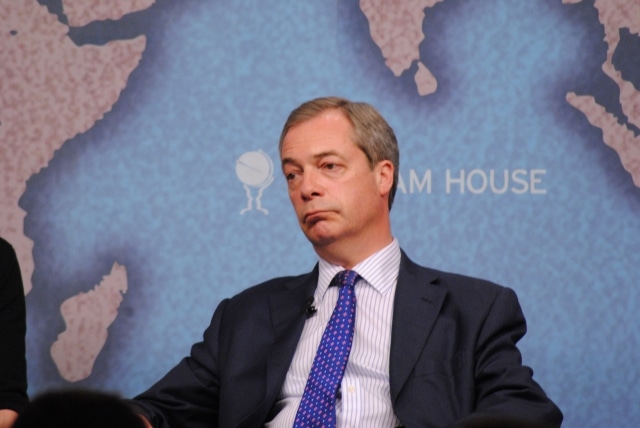Nigel Farage said he has “no idea” whether he believes in global warming last night during a Leaders Live event hosted by voter engagement group, Bite the Ballot.
The UK Independence Party (UKIP) leader’s comments come as the Met Office announces that 2014 is on course to be the hottest year on record – adding that human influence has played a key part in this.
Yet Farage continued to ignore the evidence as he clashed with the audience of young voters who will be most directly affected by climate change.
“Be careful of the scientific consensus,” he warned.
But as Greenpeace UK’s chief scientist, Doug Parr, told DeSmog UK: “The biggest science consensus in history has said climate change is a threat to global food supply and human security.
“The solutions are manageable but challenge old-fashioned thinking. How many other critical risks is Farage waving away because he prefers not to confront them?”
It seems then that UKIP is not only out of touch with a key sector of the electorate but also the science.
“Consistently warm”
According to the Met Office figures released today, Britain has been “consistently warm” this year.
While data for December has yet to come, 2014 is currently the warmest year recorded on the Met Office’s UK data series dating back to 1910.
Britain’s average annual temperature is also set to be one of the highest on record according to the Central England Temperature (CET) series which goes back to 1659.
But it’s not just Britain that’s heating up, 2014 is shaping up to be the world’s warmest year yet.
Until now, 2010 was the warmest year on record with an average global temperature of 0.56°C above the long-term average (from 1961-1990) according to the HadCRUT4 global data series which dates back to 1850.
This year’s global average temperature from January to October 2014 is currently 0.57°C above the long-term average, putting it narrowly ahead of 2010’s record heat. With two months of data still to add however, the global full-year figure could still change.
Human influence “highly” likely
Researchers also used new techniques to determine how likely an event would be in the real world compared to a world without human greenhouse gas emissions.
Peter Scott, head of climate attribution at the Met Office, said: “Our research shows current global average temperatures are highly unlikely in a world without human influence on the climate.”
“Human influence has also made breaking the current UK temperature record about ten times more likely,” he added.
In response to the Met Office’s findings, energy and climate change secretary Ed Davey said: “More record warm temperatures in the UK and across the world are yet more evidence that we need to act urgently to prevent dangerous climate change.”
With countries negotiating targets in Lima this month, Davey said current initiatives are not enough: “UK actions such as our doubling of renewable electricity and our stretching targets for cutting carbon are a good start but we must be frank and acknowledge there is more to do… Getting the whole world to act must be our priority.”
Photo: Chatham House via Flickr
Subscribe to our newsletter
Stay up to date with DeSmog news and alerts







